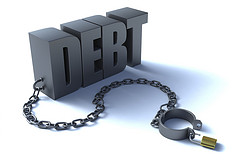A recent newspaper article in Portland, OR from The Oregonian stated that as many as 33% of all consumers will be dealing with debt collectors!
Although dealing with a debt collector can be frustrating and annoying, there is really no reason to ever fear a debt collector.
Believe me, I certainly understand why most people who find themselves in a financial situation that has caused some or all of their accounts to be turned over to a debt collector are nervous. The thought that you might lose your home, possessions and/or bank accounts would cause any sane person to be afraid.
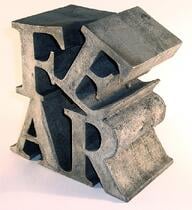
Well, the good news is that in most cases, that FEAR is not necessary!
In this blog, I am talking about dealing with unsecured debts (credit cards, store cards, medical bills, etc.) and not secured debts such as a home mortgage or auto loan.
So, here are a few things to remember and tips on how to deal with debt collectors:
It rarely does much good to talk with a debt collector on the phone.
Once your account is 60-90 days past due, you can expect a call from either the RECOVERY DEPARTMENT of the creditor or from a DEBT COLLECTION COMPANY.
While your account is still with the original creditor, the Fair Debt Collection Practices Act or FDCPA laws that allow you to put a stop to collection calls do not apply...yet!
Most of the time, when the original creditor's agent calls, they are just trying to find out what your situation is and may offer a plan to help you get back on track.
BE VERY CAREFUL!!! They may offer what is called a "HARDSHIP PLAN", whereby you agree to allow them to deduct a certain amount of money (usually less than the total amount your last statement DEMANDED) from your checking account for say, 6 months.
At the end of the 6 months, they promise to "REVIEW" your case and get you started making regular payments again. But usually, after you have paid the agreed upon amount for 6 months, your have barely made a dent in reducing your balance and are right back to where you started!
If you take the call from the original creditor, be very calm and simply say something like:
"I realize I've fallen behind on my bill and fully intend to get caught up soon. But, at this time, there is nothing I can do, so please stop calling me."
Yes, I know I just said that they have the legal right (at this point) to call, but they may honor your request and leave you alone for a month or so.
If the recovery department of the original creditor is unsuccessful in getting your to start making payments, the account most likely will be charged off and sold or transferred to a debt collector after about 120 days.
You most likely will get a letter from the debt collector and no doubt will start getting phone calls!
A Debt Collector's job is to get you to pay...period! Although there are plenty of "decent" debt collectors who actually may show some empathy for you, there are many that are just the opposite.
These debt collectors will use all kinds of tactics to get you to pay up! Although most debt collectors follow the laws and/or guidelines of the Fair Debt Collection Practices Act, there are always a few "bad apples".
Don't get into a dialog with a debt collector!
While I think it's OK to have one short conversation with the original creditor, it's usually a whole different story now that your account has been turned over to a debt collector!
If they have sent you a letter demanding payment, etc., get the address of the debt collector and write them a letter demanding that they cease calling you at home.
Here is a sample letter you can use:
If the calls don't stop (it will take a week or so) then you can file a complaint with your state's attorney general's office.
Usually, the debt collector will stop calling as they can be fined very severely!
NOW WHAT?
After a reasonable period of time (varies with each debt collector), if the debt collector is unsuccessful in getting you to start paying , the original creditor may:
- Recall the account and turn it over to another debt collector and the process will start again. Yes, you will have to send another letter to the new debt collector to stop the calls!
- Turn the account over to a Law Firm that only practices debt collection.
If your account is placed with a Law Firm that practices debt collection, you will get the same letters and calls, but now, you need to be careful.
If the Law Firm decides to FILE A CLAIM for the debt you owe on behalf of the original creditor or the debt collector, you will get a SUMMONS.
I've written several blog articles over the years on what to do if you receive a summons, but in short:
- DON'T IGNORE THE SUMMONS
- DON'T PANIC!
Most people think that a debt collector and/or debt collection law firm can just garnish your income, levy your bank account and/or put a levy on your home or other property.
While it's true that they can AFTER they are awarded a judgment, they cannot do anything until then. That's why it is so important to take action if you receive a summons!
In most cases, you can prevent the CLAIM from moving on to a JUDGMENT by contacting the attorney's office and working something out.
Most "judgments" are awarded to the creditor/debt collector/plaintiff because the debtor didn't take any pro-active steps.
If you are employed and receive regular W-2 income, then you can't let
If you...
- Are retired, with only Social Security and/or Retirement Income, or
- Disabled and receiving Disability Income only, or
- Are unemployed and receiving unemployment income, or
- Receive child support or alimony payments, then...
These sources of income are exempt from garnishment. Notice, I didn't say exempt from state or federal taxes you may owe, but from garnishment for unsecured debts.
The best way to put an end with dealing with debt collectors is to NEGOTIATE A SETTLEMENT of your account. That is, if you have some funds available to make an offer of 40%-60% of the balance.
If not, you can still usually negotiate a settlement by agreeing to make monthly payments rather than a lump sum payment, but you may have to pay a little larger settlement.
Click here for some very useful information on how to negotiate a settlement:
One final thought...
If your financial circumstances are such that you have no ability to offer a settlement, either in a lump sum or payments, then you may need to consult a bankruptcy attorney.
Bankruptcy is a way to help those who qualify to put and end to debt collectors and get a fresh start.
If all of this sounds a little overwhelming, we can help:
Photo credit:
Kevin B 3




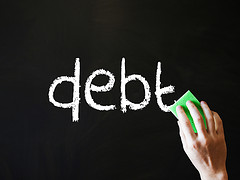 Why is that? Why do so many people, according to the article...1 in 3...have debt issues. Notice, the article didn't say they just had debt, the article stated that 33% of Americans have DEBT COLLECTION PROBLEMS.!
Why is that? Why do so many people, according to the article...1 in 3...have debt issues. Notice, the article didn't say they just had debt, the article stated that 33% of Americans have DEBT COLLECTION PROBLEMS.!

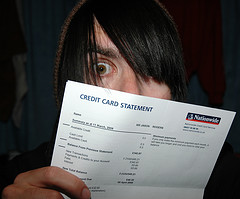
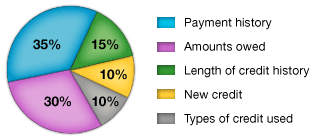
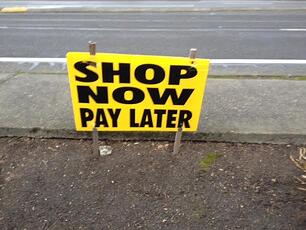
 HOW WOULD YOU FEEL IF YOU WERE DEBT FREE ? ? ?
HOW WOULD YOU FEEL IF YOU WERE DEBT FREE ? ? ?